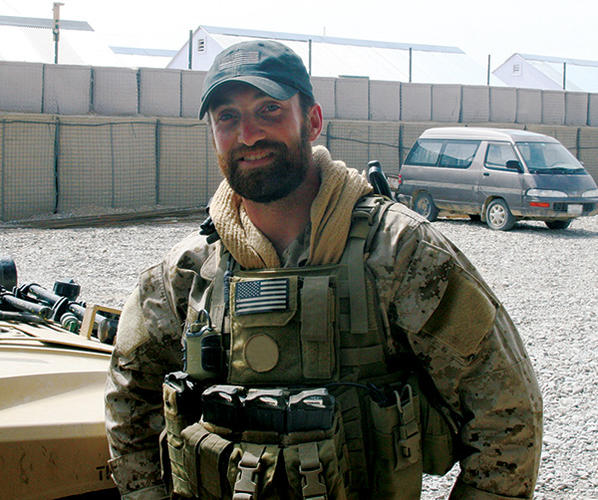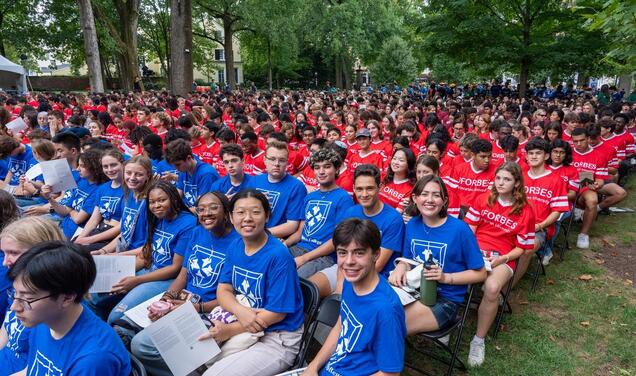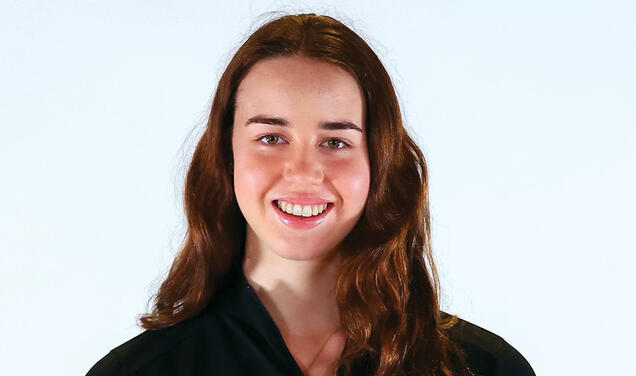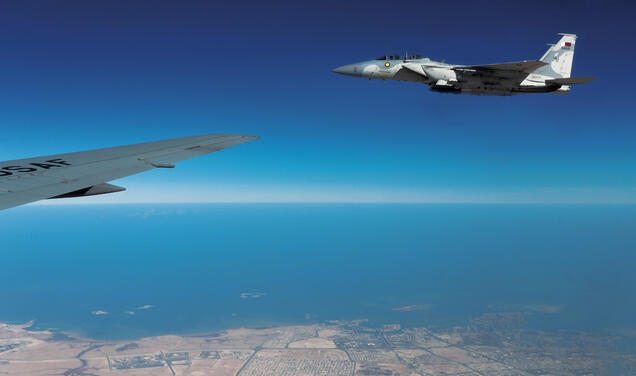
Husband, Father, Soldier, Student
Shaun Cason ’23 ranks among the graduating class’s most promising scholars and unique stories
Jack Tannous *10, an associate professor of history and Hellenic studies, met Shaun Cason ’23 in classic pandemic fashion when he drove his daughter to drop off a present for a friend whose birthday party was canceled in the early weeks of the COVID-19 lockdown. The friend, Cason’s daughter, met them outside, accompanied by her dad.
“I talked to him from the window, out on the curb, for like 10 or 20 minutes,” Tannous recalls. “And I discovered — this is my first memory of him — he’s this undergraduate at Princeton who is basically my age.”
Cason, a Marine veteran and transfer student then finishing his first year at the University, was interested in history, and Tannous, ever eager to recruit undergrads to his department, told him about Princeton’s extraordinary tradition in his specialty, Late Antiquity, as well as its strength in medieval studies.
Cason didn’t immediately realize how Tannous’ pitch might shape his path at Princeton. He had other things on his mind, like how to juggle online classes — his own and those of his two young children. But by the end of junior year, he was hooked on medieval history, thanks in part to a course on the Crusades, and as a senior this year, he undertook an ambitious thesis about a ninth-century slave revolt in the Middle East. In January, Cason was chosen to receive a Sachs scholarship, one of the University’s highest awards for postgraduate study, and will continue his academic journey in a master’s program in Late Antique and Byzantine studies at the University of Oxford.
The entire path — from deployments in Iraq and Afghanistan and community college in North Carolina to three years at Princeton and his new role as a budding Byzantinist — feels “surreal,” Cason says. But to those who have encountered him in the classroom, his rapid rise reflects his uncommon ambition, including a willingness to take on complicated historical topics and challenging new languages.
According to Professor Helmut Reimitz, Cason’s thesis adviser and the director of Princeton’s Program in Medieval Studies, “He operates on a level of sophistication and reflection that is outstanding, maybe because he brings more experience to it.”
Cason, 42, is solidly built with a generous auburn beard marked by hints of gray. Though his daily wardrobe favors sweatshirts and baseball caps, he looks more like a professor than an undergrad.
“Everybody on campus is one of one,” he says, “but I’m very one of one, in almost all the categories that you can look at.”
For example, the population of veterans on campus is growing. Cason was one of seven undergraduates to join the veteran community on campus in 2019 (freshmen and transfers); before Commencement this year, there were 36 American military-affiliated students enrolled as undergraduates, according to the University, and that number is likely to increase as the transfer population expands. But even among that group, Cason stands out. He’s a combat veteran who spent 15 years in the Marines, mostly in the branch’s special operations command, and received multiple commendations, including the Purple Heart.
Among “mature students,” he jokes, he is the oldest on campus. And he is likely the only member of the Class of 2023 who had two children (son Liam, age 11, and daughter Olivia, age 9) taking a day off from school to see their dad graduate.
“Everybody on campus is one of one, but I’m very one of one, in almost all the categories that you can look at.”
— Shaun Cason ’23
Cason briefly attended college after high school but left to join the Marines, enlisting in August 2001, a month before the 9/11 attacks (most of his classmates were born that year). Even when he was stationed abroad and focused on his missions, he maintained an appreciation of history. In Iraq, he visited the ruins of Babylon. In western Afghanistan, he says, he would walk down roads and daydream about crossing paths with Alexander the Great.
When he left the Marines, Cason shifted his ambitions to teaching (“one of the last noble professions that we have, when done correctly,” he says). By then, he was married — his wife, Whitney, a former teacher, completed a master’s degree at the University of Pennsylvania’s Graduate School of Education this spring — and he’d heard that elite colleges had a renewed interest in enrolling veterans.
“I was a kid who never even considered the Ivy League, didn’t think that anyone like me would ever belong here,” says Cason, who grew up in a military family and attended public schools. But after his military career he felt he’d matured significantly and might be the type of student Princeton and its peers were seeking. He was admitted in the second class of the University’s reinstated transfer program.
Cason arrived at Princeton, moved into tight quarters in graduate housing with his family, and dove headlong into academic life. The first semester, he says, he nearly burned out on lectures, listening to every ambassador and Nobel laureate who stepped behind a podium. He traveled to Athens with the classics department and Moscow with Near Eastern studies professor Michael Reynolds *03.
Though Cason at first leaned toward studying contemporary history, the University’s strength in medieval studies drew him in. “If I would’ve gone to any other university in the country, I wouldn’t have ended up [on] this route,” he says.
While finding an academic major was relatively easy, other aspects of his college experience have proven difficult. Like many pandemic-era students, he took a leave of absence, though in Cason’s case, it was to help care for his father after a medical emergency. The situation improved soon after he’d withdrawn for the 2021-22 academic year, but Cason found the leave to be a blessing in disguise after the stresses of two and a half COVID semesters.
“I didn’t really recognize how bad of a place I was in until I got away,” he says. “It was supposed to be to take care of my father. But when it was all said and done, it was a mental health break that I desperately needed.”
The veteran population is still a new constituency at Princeton, and for certain needs — such as mental health and family housing — there are few precedents to guide the way. One recent example: Graduating seniors are expected to leave campus soon after Commencement, but Cason’s kids still have about two weeks of elementary school. As of early May, he was still trying to confirm they would be allowed to remain in their apartment through mid-June.
Cason is gracious when speaking about these bureaucratic obstacles. The University is moving in the right direction, he says, but he also wants to see it become more proactive and add resources for future veteran undergrads. Working with the Princeton Student Veterans, he has advocated for a dedicated veteran coordinator. Keith Shaw, Princeton’s director of transfer, veteran, and nontraditional student programs, said that the University expects to have its first veteran coordinator in place by the start of the 2023-24 academic year.
In terms of connecting with other students, Cason admits he’s felt isolated at times. He has friends in the transfer and veteran communities, but some undergrads have seemed hesitant to talk with him, particularly about his military experiences. He went through boot camp with post-9/11 enlistees, participated in the 2003 invasion of Iraq, and later deployed to Afghanistan, Yemen, and North Africa. When President Donald Trump announced his infamous travel ban in 2017, Cason jokes, “I was like, man, you’re mapping my career.”
Living in base towns, Cason was used to people asking what he’d done in the Marines and where he’d served — those were everyday conversations. When Princeton students brought up the same things, he says, “You could see how nervous they [were] asking, like, what did you do? Can I ask? And they’re always very polite. I’ve never had a bad experience, but they’re very apprehensive about talking to you. I think [student veterans are] tearing down those barriers slowly.”
Cason’s most significant challenges may be the academic ones he has encountered because of his decision to study history in the medieval world. Teresa Shawcross, an associate professor of history and Hellenic studies whose work focuses on the Byzantine Empire and the Mediterranean region in the Middle Ages, notes that learning languages is critical to advancing in the field. “I confess I thought that Shaun was setting himself a very difficult and ambitious program,” she says. “When we’re children, we soak up languages like a sponge, but it becomes harder the older we get. For a mature student, it can be quite an obstacle. But he’s proved he can do it, throwing himself into Ancient and Medieval Greek. He’ll be doing Arabic next [at Oxford].”
“It’s going to be a lifelong struggle, picking up these languages,” Cason concedes, with a laugh. “But it’s worth it. I always secretly wanted to be a polyglot.”
Cason’s thesis illustrates the scope of his ambitions. He focused on the Abbasid caliphate, an Islamic dynasty that began in the eighth century, zooming in on a specific 14-year span in the late ninth century when a group of African slaves revolted in an area of what is now southern Iraq. In most histories, he says, the Zanj revolt has been little more than a footnote, usually referencing one book that is considered the gold standard on the topic. But Cason sees something more significant: an event that contributed to the eventual fall of the caliphate and had a lasting impact on the geography and history of the region.
Cason says he was drawn to the topic in part because historians have the potential to “speak for the people who don’t have voices,” including the slaves who led the revolt. Academic conversations of the period have centered on race, but Cason argues that it was more complex. “It wasn’t a racial uprising,” he says. “It wasn’t even trying to change the slave system. As they revolted, they established their own little mini-kingdom, and they kept slavery going.” The revolt, he says, appears to have been less about overturning the system and more about changing their place within it.
Reimitz says Cason’s thesis could become a book-length exploration as his career progresses. “He has the vision to think beyond [the thesis],” he says, “and that actually makes it very interesting to work with him, because we can work on a part of something larger that he can continue.”
Studying history at Princeton, Tannous says, is great preparation for graduate school, whether you realize it or not. Junior and senior independent work provides exposure to advisers and experience with planning and executing in-depth research. The junior papers themselves are tailor-made writing samples. The University often provides travel assistance for students doing thesis research abroad, and history’s connections with other departments — classics, Near Eastern studies, and art and archaeology, to name a few — can provide an expansive view of a student’s area of interest.
“Not everybody takes advantage of it, but for people who are enthusiastic and eager, I say it’s like being on the autobahn in a Ferrari,” Tannous says. “You can go 200 miles an hour here if you want. And Shaun’s in the Ferrari.”
At the same time, Shawcross says, Cason maintains a knack for collegiality. “Since we returned to in-person classes, I’ve been struck by the way Shaun is in a large group,” she says. “He has a notably calm and collected presence. And he is extremely modest. He’ll often apologize for asking supposedly basic questions or for advancing an argument based on more limited evidence than he’d like to marshal. The other students look up to him. They listen intently when he speaks.”
That combination of traits — ambition, curiosity, drive, leadership — made Cason an attractive candidate for the Sachs scholarship, named for Daniel M. Sachs ’60, a former Rhodes scholar who died young, just a few years after completing his master’s studies at Oxford’s Worcester College. While Cason had been planning to apply to graduate school, including the program he’ll pursue at Oxford, before receiving the Sachs, he had no guarantee that he would be able to pay for it. Now, along with the funding, he has joined a community of Sachs scholars, dating back to 1970, that includes distinguished academics, journalists, lawyers, doctors, and a Supreme Court justice. “I just hope I can live up to the legacy,” he says. “They’ve changed my life. They’ve changed my trajectory.”
Cason also sees the award as a positive step for the community of veterans at Princeton and in the nation at large — a community that, he notes, has much to offer and much to overcome, including mental health challenges and high rates of suicide. Higher education, he says, opens doors to new possibilities, and he’d like to see an expansion of programs like the Warrior-Scholar Project and Service to School, which help veterans prepare for and apply to college. Cason wants to play a more direct role in the future, but for now, he hopes to lead by example.
“This is a huge victory for veterans,” he says of the Sachs scholarship. “It’s showing that veterans can do this, we can excel, and we can even be leaders in these fields.
“Giving these opportunities [to attend schools like Princeton] is important. But they have to know they can do it. They have to see people succeed.”
Brett Tomlinson is PAW’s managing editor.






No responses yet